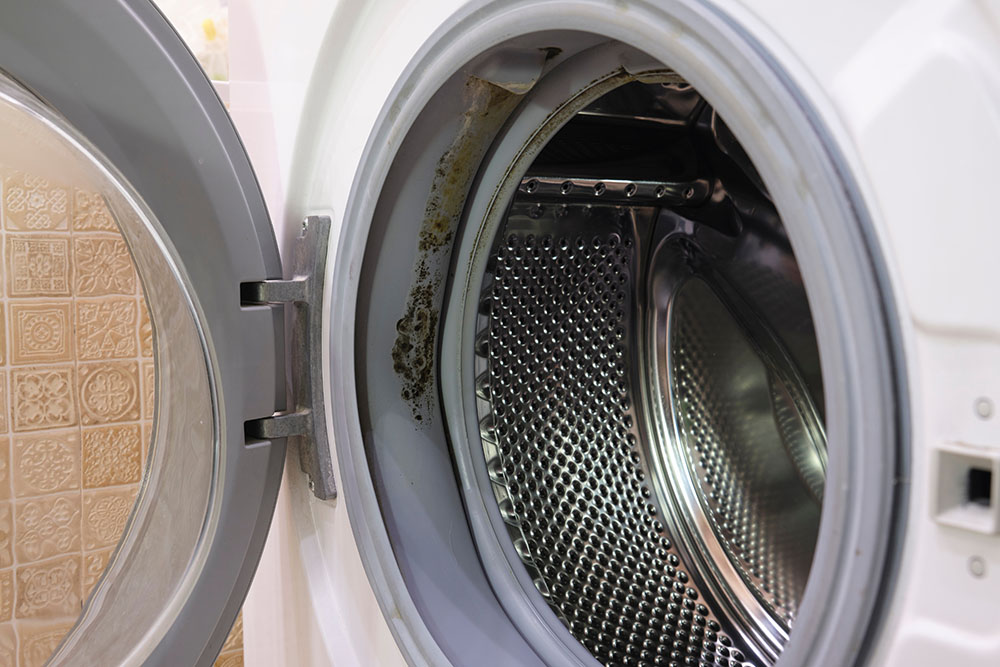How To Clean Mould From The Washing Machine

CONTENTS
- What is mould?
- Why mould grows in washing machines
- Is it a mould or sewage problem?
- The risks of mould
- How to prevent mould in your machine
- Get in touch
All appliances in your home require regular maintenance and cleaning, even if they are made for cleaning clothes or dishes. A washing machine, for example, is the perfect breeding ground for bacteria which could quickly lead to mould growth.
Here at ICE Cleaning, we offer rapid and thorough mould remediation services. Our Dewpoint-accredited technicians will diagnose the root cause of mould in your washing machine, and remove all traces of it from the appliance and throughout your home.
Read on to learn more about why mould grows in your washing machine and how to prevent it.
What is mould?
Mould is a fungus caused by excess moisture. It will grow wherever there are high levels of humidity and damp as these environments provide a source of food and water for it.
Once mould starts growing, it releases mould spores into the air which can quickly spread throughout your home and cause mould to grow elsewhere in your property.
Why mould grows in washing machines
Washing machines are one of the best environments for mould to thrive in. After you use the appliance, there is plenty of moisture left behind and trapped heat that allows bacteria to start growing.
Regular maintenance and cleaning will prevent these issues and keep your machine in the best condition possible for a long time.
Your detergent drawer is the most common place for mould to grow due to the moisture and plant-based components in detergent. However, these drawers can be easily removed and cleaned regularly.
Mould may also grow in the door’s rubber seal and quickly spread to the washing drum and detergent door. Because rubber is a porous material and the door is a tight space, the mould will lurk there and begin to spread.
Is it a mould or sewage problem?
Mould in your washing machine can give off a rotting egg smell. However, this smell could indicate a sewage problem if you cannot see any mould inside.
If your washing machine waste pipe leads to the sewage line, a clogged drain can quickly cause a backup in the pipes and produce an unpleasant odour. A blocked pipe may be the root cause of wastewater seeping in and causing mould growth.
Sewage leads to moisture and bacteria building up, providing mould with all the resources it needs to grow. To quickly determine if there is a sewage leak in your machine, you should look out for signs of:
- Pooling water between cycles in the drum
- Water spilling out onto the floor
- Machine not filling with water and washing at the wrong temperature
- Unusually loud noises during cycles
- Overflowing drains in other parts of the home
The risks of mould
If the mould begins to grow in the door’s rubber seal, it will feed on it and cause it to deteriorate. This could lead to the machine leaking between cycles. The drum paddles inside can also collect mould spores and pass them onto your clothes.
Fabric is porous and mould spores can settle deep into the pores which makes them hard to remove, especially if the clothes are still damp. Not only can it permanently ruin your clothing, but it can also put you at risk of health problems like:
- Irritated skin and eyes
- Skin rashes
- Digestive problems
- Fatigue
- Respiratory issues
- Allergic reactions
Those who are immunocompromised, young, or elderly are more at risk of the effects of mould. You must contact mould removal services to help as soon as you spot mould in your property to keep yourself and others safe.
How to prevent mould in your machine
To stop mould from growing in your washing machine and prevent it from coming back, you should follow these steps:
- Leave the machine door open between cycles to air it out
- Wipe the rubber seal dry after a cycle
- Do not leave wet clothes in the machine for too long
- Ensure you are using the correct detergent
- Clean the detergent drawer often
- Empty the lint filter after a drying cycle
- Give the machine a maintenance wash every month
- Clean the washing machine filter every 4-6 weeks
If you have already spotted signs of mould in your machine, you must not try to clean it yourself. DIY solutions such as bleach or chemical sprays can be harmful and will not stop the mould from coming back.
There could still be airborne spores in your home, only enabling the mould to return. If you spot mould in your machine, you must try to control the spread the best you can by:
- Ventilating the room
- Placing a dehumidifier in the room with the machine
- Keeping air moisture low
- Disposing of mouldy clothing
- Insulating your home
- Contacting a mould removal company
Get in touch
We are a mould cleaning company that can remove any mould in your home and significantly improve the air quality. With our lifetime guarantee*, we will return free of charge if you notice any signs of mould in your home again.
Our mould removal services are available nationwide, 24/7, 365 days a year. You can get in touch today by calling us at 0208 066 0360 or emailing us at enquiries@icecleaning.co.uk.
*subject to advisories

Speak with me today,
I’m here to help
By asking you a few questions either via phone or email I can immediately provide a realistic estimation of the cost.
You’re in good company. We’ve cleaned for the following commercial clients… View all

Why choose us?
- Cater to a wide variety of cleaning situations
- Nationwide coverage, available 24/7
- Cater to commercial and domestic clients
- Free survey provided prior to quotation
- Emergency response team
- Offer a bespoke service designed to suit all your needs
- All technicians hold professional health and safety qualifications, including BICSc, IOSH, Dewpoint Professional & Safe Contractor
We’re fully accredited
We place best practise, professional expertise and health and safety at the core of our business. We’re fully compliant with all legal obligations. You can view a list of our accreditations below, or visit our Health & Safety page for more information.











-RGB-small.1707319151.jpg)




















